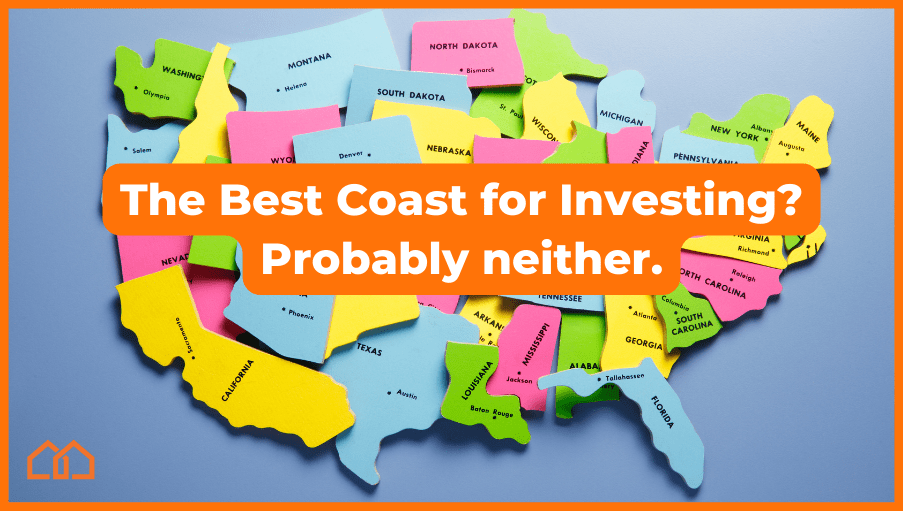Life’s easy at the beach, right? There’s nothing like tasting the salty air, feeling the sand between your toes, and hearing the endless noise of the ocean beating against the shore … or is that the sound of money flowing out of your bank account?
Well, probably both.
Beachfront property is prime real estate for a reason. Visit Malibu one time and chances are good that you’ll want to live there forever. You could say the same about San Francisco, or the Hamptons of New York, or historic Charleston, South Carolina. Unfortunately for real estate investors — and especially those eyeing property on the West Coast, the numbers don’t exactly work in your favor.
California Pipe Dream
Say you live in Los Angeles. You know the area well and you’d love to buy a property in Santa Monica. That sounds good, but the reality is that the yield on that property could actually be less than half of what you’d find in some other parts of the country.
In California, you might get a 4% cap rate, whereas in the Midwest or Southeast, you could be at 7% or 12%. And because we’re talking about the Golden State, you’ll also have to consider that California recently enacted rent control legislation, effectively limiting the amount that a landlord can raise rent on a tenant. You’ll also be subject to some of the strictest tenant-landlord rules in the country, outside of maybe Chicago.
After doing the math, you’ll realize that you’re better off buying a stable $100,000 home in a nice Midwestern suburb that rents for $1,200 a month than you are buying an already appreciated $1 million-dollar cottage on the West Coast that rents for a low yield.
When rent yields are this low, real estate investing becomes a purely speculative endeavor. And when too many people are playing that game — relying on rent income that can’t even cover a mortgage and simply praying that property values keep increasing — you’ve got yourself a classic real estate bubble.
Beyond the Numbers
Aside from much better yields, real estate in undiscovered states is less competitive. You won’t be up against the big institutional investors that are daring you to outbid them for properties on either coast. It’s not that these funds don’t see the value in buying property in Middle America — it’s just that they can’t buy in these areas because of how their capital is structured. They’re limited to deploying money in specific geographic regions.
Smart real estate investors seek to minimize risk. The volatility of home prices in a place like New York City, where values can quickly drop 50% and then double again, makes it hard to project future returns. In contrast, the stability of property values in Indiana or Missouri makes for a far less stressful ride as an investor.
With the above considerations in mind, here are two competing strategies for pragmatic investors looking for long-term returns on real estate. Either one could work for you, and the right approach generally depends on what you’re comfortable with as an investor:
1. Choose yield over buying in your backyard.
Yes, there is something to being familiar with an area, but get familiar with math. Buy strong yields and you will be far happier with big monthly returns even if the market goes down, or up.
The impressive yields found in places like Augusta, Georgia, or Grand Rapids, Michigan, should be more attractive to savvy investors than the spectacular views of Laguna Beach. The difference between generating 4% yield and 10% yield is significant.
2. Be comfortable buying remotely.
If you live in a place like California, profitably investing in local real estate might simply be impossible. A lot of people in California have a lot of money, and they’ll be the first to tell you that buying a house in Newport Beach or San Diego is a risky undertaking that probably won’t be financially lucrative. That doesn’t mean you can’t invest, however.
The reality is that buying property remotely can actually be far more profitable, because there are still plenty of booming real estate markets in the U.S. A $100,000 home in Louisville, Kentucky, or Birmingham, Alabama, could generate plenty of income, even if you have to pay someone to manage the property for you. If the plumbing breaks or a lock needs to be replaced, you won’t be able to handle repairs yourself, but with a little research, you’ll find someone who can. The benefit of working with professional contractors? They’ll probably do the job better than you could.
The bottom line: Always take into account your personal goals when deciding where to invest. If your goal is to make money, don’t limit your prospects to just one geographic location. From coast to coast, opportunities abound. You just need to know where to look.

